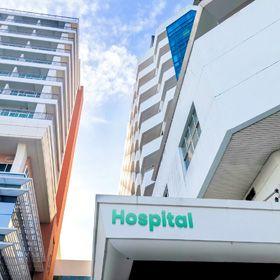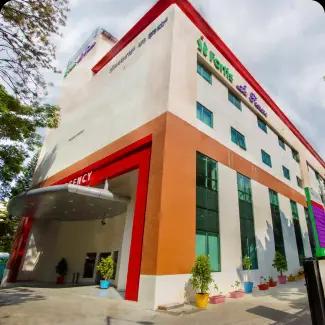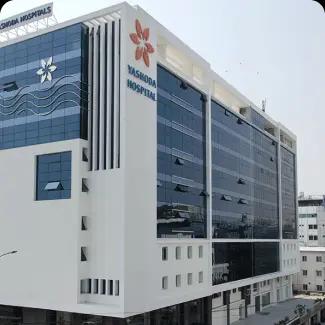
Thrombectomy
Thrombectomy is a medical procedure used to remove a blood clot (thrombus) from a blood vessel, typically in cases of acute stroke or deep vein thrombosis. This procedure helps restore normal blood flow and prevents damage to tissues and organs due to restricted blood supply.
Easy Medical Visa Approvals
Travel Booking Assistance
Comprehensive Treatment Plans
Multi-Language Support
Thrombectomy is a medical procedure used to remove a blood clot (thrombus) from a blood vessel, typically in cases of acute stroke or deep vein thrombosis. This procedure helps restore normal blood flow and prevents damage to tissues and organs due to restricted blood supply.
Benefits of Thrombectomy
Symptoms
Types of conditions
There are undefined main types of Thrombectomy
CAUSES:
- Blood Clots: Formed due to conditions like atrial fibrillation, deep vein thrombosis (DVT), or atherosclerosis.
- Embolism: A blood clot that travels through the bloodstream and lodges in a narrow vessel, causing a blockage.
- Atrial Fibrillation: An irregular heartbeat that can cause blood to pool and clot in the heart.
- Atherosclerosis: Hardening and narrowing of the arteries due to plaque buildup, increasing the risk of clot formation.
- Sedentary Lifestyle: Prolonged inactivity can lead to blood clot formation, especially in the legs.
- Smoking: Damages blood vessels and increases the risk of clot formation.
- Genetic Factors: Certain inherited conditions may increase the risk of clot formation.
SYMPTOMS:
- Sudden Weakness or Paralysis: Often on one side of the body, particularly in cases of stroke.
- Loss of Speech or Vision: Sudden difficulties in speaking, understanding, or seeing.
- Severe Headache: Often associated with stroke when a blood clot blocks a brain artery.
- Pain or Swelling: In the affected limb, commonly in cases of deep vein thrombosis.
- Coldness or Pallor: Affected limbs may feel cold or appear pale due to reduced blood flow.
- Numbness or Tingling: Sensation changes in the affected limb due to nerve compression or blood flow obstruction.
- Difficulty Walking: Loss of coordination or balance, especially if the clot is in the brain.
DIAGNOSIS:
- Imaging Studies: CT scans or MRIs to visualize blood clots and assess the extent of blockage.
- Ultrasound: Used for detecting clots in veins, especially in the legs (DVT).
- Angiography: A specialized imaging technique using contrast dye to visualize blood vessels and locate blockages.
- Blood Tests: Assess clotting factors and overall blood health, identifying risk factors for clot formation.
- Patient History: Review of symptoms, risk factors (e.g., heart disease, smoking), and previous clotting incidents.
- Physical Examination: Evaluates symptoms like swelling, pain, or neurological deficits related to blood clots.
- EKG: Detects heart rhythm abnormalities, like atrial fibrillation, that may lead to clot formation.
TREATMENT:
- Mechanical Thrombectomy: A minimally invasive procedure using catheters to physically remove the clot from the blood vessel.
- Anticoagulants: Medications like heparin or warfarin to prevent further clot formation.
- Thrombolytic Therapy: Administration of clot-dissolving drugs (e.g., tissue plasminogen activator) to break down the clot.
- Catheter-Directed Thrombolysis: Delivers clot-dissolving drugs directly to the site of the clot through a catheter.
- Balloon Angioplasty: Used to widen the blood vessel after clot removal to restore normal blood flow.
- Stent Placement: A small mesh tube inserted into the vessel to keep it open and prevent future blockages.
- Post-Procedural Care: Includes monitoring for recurrence, medication management, and lifestyle changes to reduce clotting risk.
Your journey to good health begins here

Accredited Hospitals
Nationally accredited hospitals for high-quality care

Multi-language Support
Convey your needs in the language you're most comfortable in

Travel Booking Assistance
Seamless booking assistance for your healthcare journey

Personalised Treatment Plans
A treatment journey tailored to all your preferences and needs

Unparalleled Hospitality
Experience exceptional hospitality during your stay

Easy Medical Visa Approvals
Dedicated assistance for medical visa requirements
Plan your healthcare journey with Karetrip!
India’s Best Hospitals are Partnered With Karetrip
Access World-Class facilities from top Hospitals across India
Consult with India’s most experienced doctors
Experience premium care from India’s leading specialists

Dr. Sanjeev Mohanty
ENT Surgeon
31+ Years Of Experience

Dr. Santosh Shivawswamy
ENT & Head And Neck Surgeon
16+ Years Of Experience

Dr. Sharad Mohan
ENT Surgeon
27+ Years Of Experience

Dr. Uday Pol
ENT Surgeon
36+ Years Of Experience

Dr. Sanjay Tulsiram Helale
ENT Surgeon
28+ Years Of Experience

Dr. W.V.B.S Ramalingam
ENT Surgeon
37+ Years Of Experience
Cost Estimation
Learn about the expenses involved in the procedure and what factors affect them.

The minimum cost for a thrombectomy procedure is approximately INR 1,00,000. On average, the price for this procedure is around INR 2,50,000. The maximum amount that may be charged for a thrombectomy can go up to INR 4,00,000.
Factors affecting the cost of thrombectomy include hospital admission fees, surgeon fees, the patient’s health and condition, the procedure’s complexity, anesthesia type, post-procedure care, diagnostic tests, and room type.
The average cost of the Thrombectomy in India is around null to null.

High Cost
Average Cost
Low Cost
The LIST of AVERAGE COST of the Thrombectomy across TOP 0 cities in India in Indian Rupee (INR) is as follows :
City
Lowest Cost
Average Cost
Highest Cost
Commonly Asked Questions
What is thrombectomy?
Thrombectomy is a medical procedure that removes a blood clot from a blood vessel to restore normal blood flow and prevent tissue or organ damage.
When is a thrombectomy needed?
It is needed in cases of acute ischemic stroke, deep vein thrombosis, or pulmonary embolism where a blood clot obstructs vital blood flow.
How is thrombectomy performed?
The procedure is typically performed using a catheter inserted through a blood vessel, guided to the clot's location, where the clot is then mechanically removed.
What are the risks of thrombectomy?
Risks include bleeding, infection, damage to the blood vessel, or stroke if the clot fragments and travels to another part of the body.
What is the recovery time after a thrombectomy?
Recovery time varies, but most patients experience significant improvement within a few days, although full recovery may take weeks depending on the clot's location and severity.

Do you still have a query?


"I had a successful surgery at Fortis Escorts Hospital, and it was all thanks to Karetrip's help in finding the right hospital for me. The entire process was smooth and stress-free, with Karetrip handling all the arrangements and answering any questions I had. The medical team at the hospital was outstanding, and the facilities were top-notch. I highly recommend Karetrip to anyone looking for a tension-free healthcare experience."
Read MoreFatima
Chattogram


"Thanks to Karetrip, I got connected with MAX Hospital in New Delhi. The team guided me through every step – from finding the right doctor to handling travel and visas. They made a daunting process feel like a breeze. The care I received at MAX Hospital was outstanding, and I can't thank Karetrip enough for making it possible. They truly put patients first and go the extra mile to ensure a smooth healthcare journey. I'm grateful beyond words!"
Read MoreHasan
Dhaka


"At first, I was unsure about having a medical procedure done in a foreign country. However, Karetrip's team at Indraprastha Apollo Hospital made me feel much better. The hospital was very clean, modern, and had everything they needed to help me. The staff were very kind and did everything they could to make me feel comfortable. I'm really happy with how my treatment turned out, and I appreciate Karetrip for making it easy and stress-free."
Read MoreImran
Sylhet
 Google Reviews4.9/5
Google Reviews4.9/5




I had a successful surgery at Fortis Escorts Hospital, and it was all thanks to Karetrip's help in finding the right hospital for me. The entire process was smooth and stress-free, with Karetrip handling all the arrangements and answering any questions I had. The medical team at the hospital was outstanding, and the facilities were top-notch. I highly recommend Karetrip to anyone looking for a tension-free healthcare experience.
Fatima
Chattogram
 Google Reviews4.9/5
Google Reviews4.9/5



















